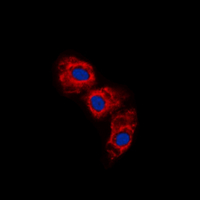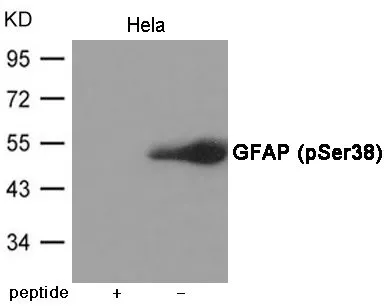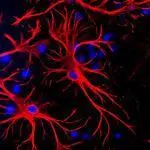![FACS analysis of T98G cells using GTX18062 GFAP antibody [GFAP/2076]. Blue : Primary antibody Red : Isotype control FACS analysis of T98G cells using GTX18062 GFAP antibody [GFAP/2076]. Blue : Primary antibody Red : Isotype control](https://www.genetex.com/upload/website/prouct_img/normal/GTX18062/GTX18062_20200115_FACS_1882_w_23060620_820.webp)
FACS analysis of T98G cells using GTX18062 GFAP antibody [GFAP/2076]. Blue : Primary antibody Red : Isotype control
GFAP antibody [GFAP/2076]
GTX18062
ApplicationsFlow Cytometry, Western Blot, ImmunoHistoChemistry, ImmunoHistoChemistry Paraffin
Product group Antibodies
TargetGFAP
Overview
- SupplierGeneTex
- Product NameGFAP antibody [GFAP/2076]
- Delivery Days Customer9
- Application Supplier NoteWB: 1-2microg/ml. IHC-P: 1-2microg/ml for 30 minutes at RT. *Optimal dilutions/concentrations should be determined by the researcher.Not tested in other applications.
- ApplicationsFlow Cytometry, Western Blot, ImmunoHistoChemistry, ImmunoHistoChemistry Paraffin
- CertificationResearch Use Only
- ClonalityMonoclonal
- Clone IDGFAP/2076
- Concentration0.2 mg/ml
- ConjugateUnconjugated
- Gene ID2670
- Target nameGFAP
- Target descriptionglial fibrillary acidic protein
- Target synonymsALXDRD, glial fibrillary acidic protein
- HostMouse
- IsotypeIgG1
- Protein IDP14136
- Protein NameGlial fibrillary acidic protein
- Scientific DescriptionThis gene encodes one of the major intermediate filament proteins of mature astrocytes. It is used as a marker to distinguish astrocytes from other glial cells during development. Mutations in this gene cause Alexander disease, a rare disorder of astrocytes in the central nervous system. Alternative splicing results in multiple transcript variants encoding distinct isoforms. [provided by RefSeq, Oct 2008]
- Storage Instruction-20°C or -80°C,2°C to 8°C
- UNSPSC12352203

![IHC-P analysis of human cerebellum tissue using GTX18062 GFAP antibody [GFAP/2076]. IHC-P analysis of human cerebellum tissue using GTX18062 GFAP antibody [GFAP/2076].](https://www.genetex.com/upload/website/prouct_img/normal/GTX18062/GTX18062_20200115_IHC-P_406_w_23060620_753.webp)




